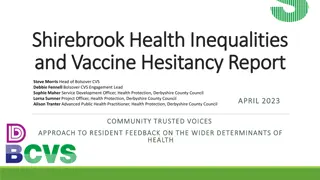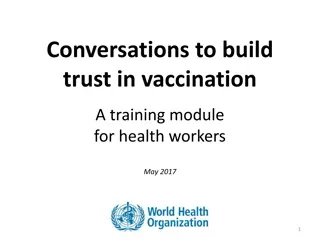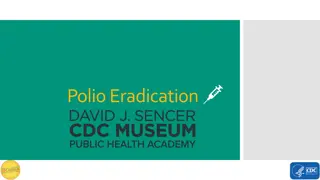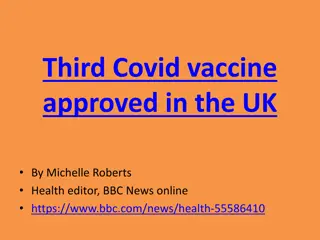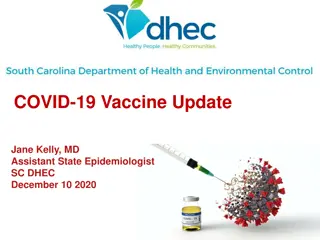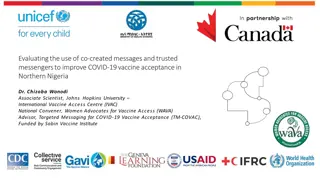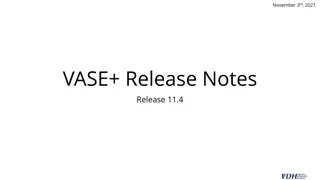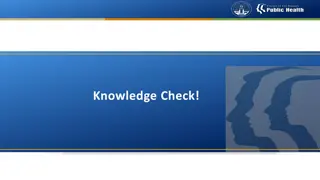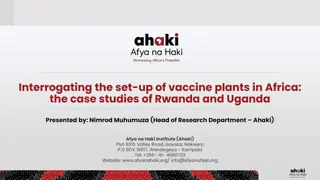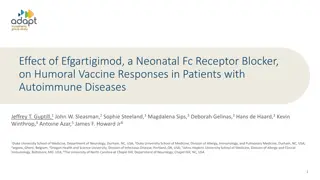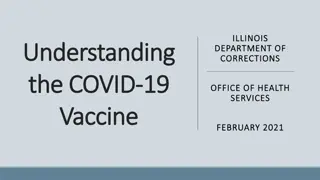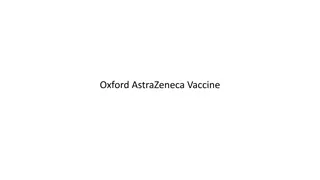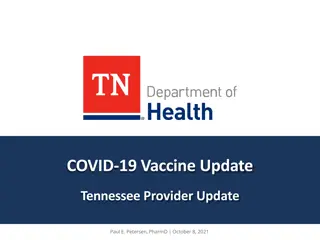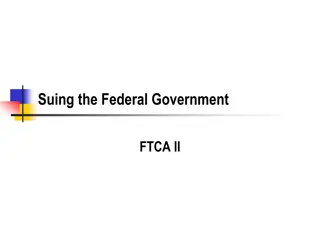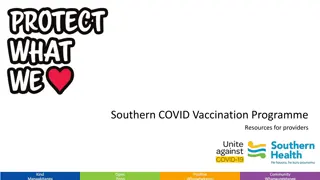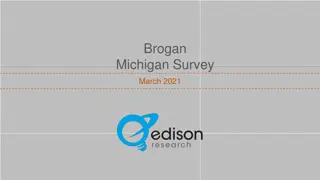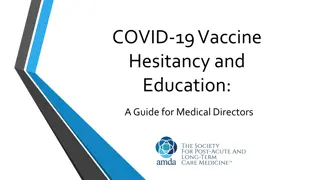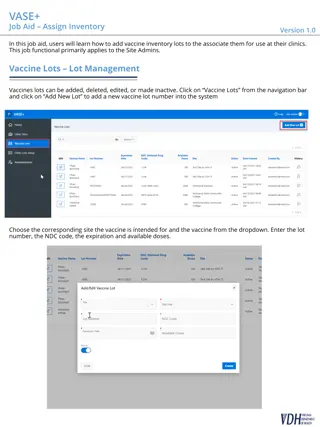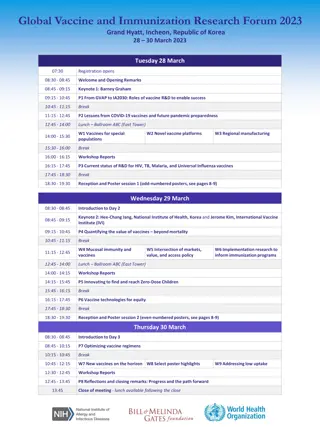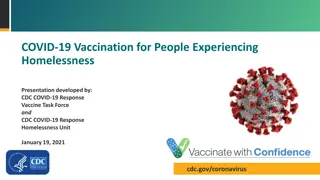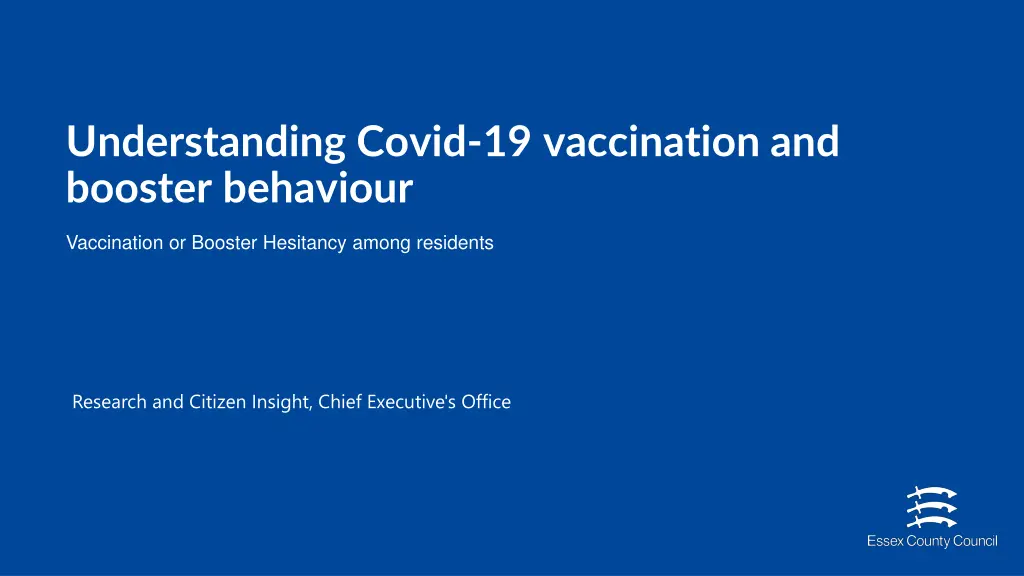
Understanding Covid-19 Vaccination and Booster Hesitancy Study
Explore the research findings on Covid-19 vaccination and booster hesitancy among residents in Essex. Discover the reasons behind refusal or delay of vaccines, barriers, facilitators, and potential solutions. Insights gathered through surveys and interviews provide valuable perspectives for addressing hesitancy.
Download Presentation

Please find below an Image/Link to download the presentation.
The content on the website is provided AS IS for your information and personal use only. It may not be sold, licensed, or shared on other websites without obtaining consent from the author. If you encounter any issues during the download, it is possible that the publisher has removed the file from their server.
You are allowed to download the files provided on this website for personal or commercial use, subject to the condition that they are used lawfully. All files are the property of their respective owners.
The content on the website is provided AS IS for your information and personal use only. It may not be sold, licensed, or shared on other websites without obtaining consent from the author.
E N D
Presentation Transcript
Understanding Covid-19 vaccination and booster behaviour Vaccination or Booster Hesitancy among residents Research and Citizen Insight, Chief Executive's Office
Contents This report provides the methodology and findings for the Understanding Covid-19 vaccination and booster behaviour research project, including: Item Background and research aims Overview of methods Central findings summary Possible implications for action Top-line insights survey: methods and findings Qualitative study: methods and detailed findings Appendix A: details on methods, including underlying theory References Page Number 3 - 4 5 7 - 8 9 - 10 13 - 15 17 - 29 31 - 32 34 Produced by Essex County Council Policy Unit 19/08/2025 | 2
Background Since its first reported case in 2019, the covid-19 pandemic has led to nearly 179 million infections and 3.88 million deaths globally as of 24 June 2021. Despite quick and concerted vaccination programs implemented by governments globally, such efforts have been constrained by vaccine hesitancy. The World Health Organization identified vaccine hesitancy as one of the ten threats to global health in 2019. It is defined as the delay in acceptance or refusal of vaccination despite the availability of vaccination services by the Strategic Advisory Group of Experts on immunisation. [1] Vaccine hesitancy forms a critical barrier to the uptake of the COVID-19 vaccine and can seriously jeopardise the successful implementation of the vaccine campaign and the economic recovery. Produced by Essex County Council Policy Unit 19/08/2025 | 3
The aim of our research This research aims to investigate vaccine hesitancy in Essex (vaccination and booster hesitancy). Our research questions were designed to investigate the reasons why residents delay or refuse the vaccination or booster dose, with a focus on understanding the barriers and facilitators, and what could be done to help address hesitancy. We explored - 1.Why are Essex residents refusing or delaying covid vaccines? 2.What are the facilitators and barriers to getting vaccinated? 3.What could be done to help the Essex community get vaccinated and reduce hesitancy? Produced by Essex County Council Policy Unit 19/08/2025 | 4
Overview of Approach Mixed Methods Online Survey February March 2022 In-depth interviews March April 2022 12 residents participated in one-to-one interviews A survey screener was circulated to recruit to interviews. There was a good spread of participant gender and age, 1 participant from ethnic minority groups, and a good spread of vaccine hesitant or booster hesitant. We reached a total of 801 residents. Promoted across multiple internal and external partner routes, including EEC social media channels, local organisations and community groups, CCGs and faith communities. Gathered top line insights into motivations and barriers. A self-selection/online sample was used. The interview guide was designed to capture the residents reality and, most importantly, their perspectives. Based on the content of these interviews, we are confident a point of data saturation was reached. Data from the National Immunization Management System Dashboard suggested that in Essex, three districts, Basildon, Epping Forest and Harlow have the lowest vaccine and/or booster uptake. Residents from these districts were therefore prioritised. 19/08/2025 | 5
Central Findings The core reasons for people not receiving the vaccination or booster dose: Risk perceptions of Covid-19 and the vaccination Role of and trust in authority/professionals Knowledge of the vaccinations Participants felt people were being coerced and forced to take the vaccine, and they believe it s a personal choice Desire to move on from Covid-19 Participants don t believe that the vaccines are effective Do not perceive Covid-19 as a threat to their health They believe there is a lack of open & honest debate in the public domain about the Covid-19 data and the side effects of the vaccine The language and labels used (e.g., "anti-vaxxer") has increased hesitancy and distrust, and led some to become more entrenched in their views Vaccines are perceived as necessary only for the most vulnerable They found difficult to navigate all the information around the vaccine and the confusing/conflicting messages received There are concerns about the vaccine side effects and safety Conspiracy beliefs and ulterior motivations to covid and/or the vaccine were commonly cited The roll-out organisation and accessibility has been viewed positively; few accessibility barriers were raised. Produced by Essex County Council Chief Exec's Office, Research and Citizen Insight 19/08/2025 | 7
3 Personas came out from our findings People who made their own choice Risk perceptions (covid and vaccination) Efficacy beliefs Knowledge and openness of vaccine data Official communication - levels of coercion and labels Sometimes also conspiracy beliefs Booster hesitant Previous adverse side effects after the first or second dose But additionally, shared similar beliefs as those who'd made their decision Doesn t fit with personal characteristics Vegan and vegetarian lifestyle, but also shared above beliefs Wanted it, but exempt from vaccine due to prior severe reaction to another vaccine Insights and possible implications/actions for the 'own choice' beliefs are found on the next slide 19/08/2025 | 8 Produced by Essex County Council Chief Exec's Office, Research and Citizen Insight
Insights and possible implications/actions Insights Personal choice is highly valued among hesitant residents, there is the perception that people are being forced and coerced into taking the vaccine. Scaremongering has increased hesitancy. Possible Implications/Action Tone and message of communications will be important. Avoid messaging and tones pressuring people to take the vaccine, recognising it's a choice. So what? The language around 'anti-vaxxer' and 'vaccine hesitant' labels have contributed to hesitancy. Language in all sectors about vaccine behavior needs reviewing. A lack of trust towards authority, such as the Government and NHS. Tone and message again will be important. Avoid authoritarian communications that feel governmental, as these will not be trusted. Work to build trust will be important. Many felt Covid-19 is not a threat to their health so the vaccine is unnecessary for them. This led to the perception that the vaccine is only needed for those most vulnerable, with the vaccine risks outweighing the benefits of being vaccinated. Messaging around their health is not likely to be impactful. Ensure all advantages of vaccines are communicated and understood (e.g., access to events, travelling). Most feel the vaccine isn't effective, people still catch and pass on covid. The vaccine being 'out of date' to the current disease strain was another barrier. Ensure all advantages of vaccines are communicated and understood, having clarity and consistency on the purpose of it. Marginal gains may be made if a new, up to date version of the vaccine was developed. E.g. The advantages are about reduced symptoms and severity, not about catching covid or passing it on. Produced by Essex County Council Chief Exec's Office, Research and Citizen Insight 19/08/2025 | 9
Insights and possible implications/actions So what? Insights Perceived lack of open, two-sided debate was commonly cited official messaging and publications mostly 'pro' vaccination has led some to develop a siege mentality, entrenching their skeptism about the vaccination Possible Implications/Action Publication and accessibility of all research and data regarding the vaccine needs improving, including negative side effects, to allow informed decisions to be made The amount of information and conflicting information about the vaccine created confusion and uncertainty for some. They are concerns about the side effects and safety of the vaccine. Healthcare professionals were commonly enquired with about this. However, they were unable to answer or continued with the 'oh you must take it' messaging, without a real answer as to why. Having a two-sided debate about the vaccine and its' potential side effects tailored to specific individuals and their needs might help. This may be a role for healthcare professionals, such as GPs. Conspiracy beliefs and ulterior motivations behind either covid- 19 or the vaccination were commonly cited. Such information is present on multiple information streams, including the internet and social media. Conspiracy beliefs and misinformation needs to be counteracted and addressed. The roll-out organisation and accessibility has been viewed positively; few accessibility barriers were raised. Continue to have an accessible, available vaccine for people, should they wish to take it. Consider that smaller spaces with fewer people present might be better for individuals to get the vaccine who have been isolated and don t like mixing. Produced by Essex County Council Chief Exec's Office, Research and Citizen Insight 19/08/2025 | 10
In short implications/actions - a balancing act with the right messages The right tone Having a two-sided debate about the vaccine and its' potential side effects - tailored to specific individuals and their needs if possible Be clear on the purpose of the vaccine (it prevents hospitalization not the transmission). Inform them respecting the fact that it is a personal choice. Avoid authoritarian communi- cations. Barriers to Vaccine Side effects, doubts over the safety/efficacy, doubts over necessity, false beliefs (conspiracy), and sense of coercion When it comes to promoting mass drug administration (vaccine), it is essential to understand the complexity of the public. Official communication Language and labels, lack of trust, lack of honest debates and clarity of data The public is not a homogeneous entity. It is complex, composed of individuals, families, and other groups shaped by contexts, experiences, and desires in a constellation of communities with different health literacy patterns, values, and expectations. Counteract conspiracy beliefs and misinformation Essex residents' hesitancy 19/08/2025 | 11 Produced by Essex County Council Chief Exec's Office, Research and Citizen Insight
Understanding Covid-19 vaccination and booster behaviour A top-line insight survey
Online survey To gather top-line insights: Through skip logic questions three type of respondents were identified: The online survey was divided into the following sections: Not hesitant refers to participants that have received the primary course and booster dose; had not yet been vaccinated but planning on; or received one or two doses of the primary course, and responded either very likely or somewhat likely on intention to receive booster Covid-19 vaccination status Likeness of getting the booster vaccine; The reasons that would make unlikely to have the Covid-19 booster; What would encourage to get the Covid-19 vaccine/Booster; Booster hesitant refers to participants that have received one or two doses of the primary vaccination course, and responded one of the below to intention on getting the booster dose: very unlikely, somewhat unlikely, neither likely nor unlikely, or I don t know; The reasons for not planning to have the Covid-19 vaccine; Willingness to participate in the second phase of the research and have a follow-up one-to-one interview. Vaccine hesitant refers to participants that have not received a vaccination and are not planning to have the Covid-19 vaccine. Produced by Essex County Council Strategy Insight and Engagement 19/08/2025 | 13
Survey hesitant participants reasons for not getting the vaccine or booster vaccine The reasons that the most vaccine hesitant survey participants and most booster hesitant survey participants gave for not getting the vaccine are: vaccine side effects (short and long-term), necessity of the vaccine (from previously being infected with covid-19, or being young and healthy) "The previous gold standard of halting a new vaccine programme unexplained deaths has been ignored. The level of government, media organisation coercion to the population to have the vaccine is extreme blackmail abuse. advertising is out of all proportion. The claims of the efficacy of the manufacturers and backed by government has now after over one year been seen to have been exaggerated. It has never been purported to prevent an infection or so isn t a vaccine it s a prophylactic therapeutic injection. The side effects are too high. have a healthy immune system. The virus mutation is faster than vaccine development can keep up with." (Vaccine hesitant) after a number of and other and fear borderline monger The transmission I I don't feel comfortable having repeated doses with no clear end in sight when the vaccine is not even licensed & current & future side effects are not known. I also don't believe the vaccines are as effective as we were led to believe at the beginning . (Booster hesitant) Produced by Essex County Council Policy Unit 19/08/2025 | 14
What encouraged or would encourage people to get the vaccine? We asked people what encouraged or would encourage them to get the vaccine. Most cases among the not hesitant participants gave reasons related to risk perceptions and fear of covid Similar reasons were given among the booster hesitant sample, they also expressed wanting to make it easier to travel and attend events, though most responded 'none of the above'. % of cases (not hesitant) - what encouraged or would encourage them % of cases (booster hesitant) - what would encouraged or would encourage them I want to protect myself and others from Covid-19 90% None of above 41% I want to protect the NHS and other health care workers easier to go on holiday abroad, attend nightclubs other events 57% 34% Hearing about people who had got very ill with the coronavirus (COVID-19) 39% I want to protect myself and others from Covid-19 31% easier to go on holiday abroad, attend nightclubs other events Hearing about people who had got very ill with the coronavirus (COVID-19) 38% 14% talking to family, friends or colleagues about having a vaccine for Covid-19 My employer told me I needed to get a vaccination/booster 20% 13% Talking to my GP, other healthcare professionals or the NHS I want to protect the NHS and other health care workers 18% 9% Hearing from a public figure such as a well- known person or a faith leader Talking to my GP, other healthcare professionals or the NHS 7% 9% My employer told me I needed to get a vaccination/booster talking to family, friends or colleagues about having a vaccine for Covid-19 4% 8% Hearing from a public figure such as a well-known person or a faith leader None of above 2% 5% 0% 20% 40% 60% 80% 100% 0% 5% 10% 15% 20% 25% 30% 35% 40% 45% Produced by Essex County Council Policy Unit 19/08/2025 | 15
Understanding Covid-19 vaccination and booster behaviour A qualitative study methods and main results
Interview guide for the one-to-one interview The interview guide was divided into the following sections: Introduction - aims to capture the resident s perception of Covid-19 Vaccine/booster; Knowledge - aims to capture the residents familiarity with the Covid-19 vaccination and vaccination process; Beliefs about consequences and emotion - aims to explore perception of risk and affect towards Covid-19 and the vaccinations; Environmental - aims to explore environmental barriers and facilitators to receiving the vaccine; Social influences - aims to explore social norms, such as how the family/social network influences their choice; Social/ professional roles - aims to explore the reputation of official communication and the role of social institutions in the society, such as the UK Government and NHS. This was developed following constructs present in the Theoretical Domains framework, and those highlighted as important to understanding covid-19 vaccination behaviour in previous research. The interview guide was designed to capture the residents reality and, most importantly, their perspectives. Questions to ask how or why are best answered through qualitative methods. Participants can speak within their terminology and understandings, developing their thoughts without the researchers' pre-supposed opinion to provide in-depth and rich answers. Qualitative data were analysed using the thematic analysis method described by Braun and Clarke. [8] Produced by Essex County Council Strategy Insight and Engagement 19/08/2025 | 17
Risk and severity perceptions towards Covid-19 Risk perceptions have changed; participants expressed desire to move on from Covid-19 and don t perceive Covid-19 as a threat to their health anymore. There is now a better understanding of how to deal with it. Concerns about the manipulation and honesty of data were raised, questioning the severity of covid and necessity of the vaccine. Changing risks over time, normal life alongside covid Manipulation of deaths data The years 2020 and 21, there has been no excess deaths. but if you have a look at what's counted as deaths, you'll see that the normal in an old folks home, people die from pneumonia [...] strokes, heart attacks, oh no this all goes down as covid. if a man fell down the stairs and hit his head on the phone table, it went down as covid, because had been in contact with covid in the last month or last 2 weeks or whatever it was determined this week. there have been no excess deaths.... you have a look, there haven t been any deaths from hearts attacks, from pneumonia, from stroke, it s all covid, every death is covid. and the Dr who signs it on as covid, and I know this from talking to them, they in the early days they were getting 27 in their back pocket, was 47 by 21 {2021}, so they could either take the money or go through an awful lot of paperwork, it took them 30 minutes to write up a patient who died of anything other than covid (Vaccine hesitant, Male 60-69) Obviously, initially when we first heard about the Covid-19, none of us knew what it was, and yep there was anxietyaround, now I can t care less. [ ] So we are now in the place where we have a better understanding of Covid-19, and I am just living my life as best as I can. [ ] I don't see any other options other than to live alongside and to just get on with it . (Vaccine Hesitant Female, 30-39). Just pack it in. It s finished now. There s no germ or virus that s lasted this long (Vaccine Hesitant, male, 50-59) Produced by Essex County Council Strategy Insight and Engagement 19/08/2025 | 18
Risk and severity perceptions towards Covid-19 Low perceived severity and risks Low-risk perceptions towards covid- 19 were commonly expressed. "I had a bit of the snots, got over it, it was a cold (Vaccine hesitant, male, 50-59) They symptoms, and/or their perceived risk of severe outcomes from covid-19 low. had experienced mild It was just like a heavy cold. I tested positive for 6 days and after that I didn t feel too bad maybe tired for another week after that, but other than that ok I don t mix, I never mix in great crowds, never go in supermarkets, things like that, so I would consider my risks are minimal. (Booster Hesitant, Male, 70-79) When you look at the death rates and things like this, when it first happened, it was predominantly around much older generations. So, I think I always felt like, yeah, there's a small risk, but most people within my age group that died had underlying medical conditions. So, I thought I just didn't see the urge to get it done. (Vaccine Hesitant, female, 40- 49) Some residents also expressed low perceived susceptibility Covid-19. catching The necessary vulnerable groups. vaccine is perceived for the as When this all started, they said we had to do everything we can do to protect the vulnerable. [...] we're in a position where everyone who's vulnerable has been vaccinated, which is good thing. And now yes, the rest of us can just go back to our lives, get covid, but hopefully we will be okay (Vaccine hesitant, Male 60-69). only most This is consistent with the survey 54% of 'vaccine hesitant' respondents selected "I already had covid-19" as a reason to not have the vaccine, and 45% among the 'booster hesitant' sample; I would concede probably in cases that the booster is needed for certain people, but I don t put myself in that category. I think that people that are living in care homes, in close proximity to other people, they probably might need to have a little bit of extra protection (Booster hesitant, male, 70-79) 30% of 'vaccine hesitant' and 'booster hesitant' samples responded "I'm young and healthy" as a reason to not have the vaccine Produced by Essex County Council Strategy Insight and Engagement 19/08/2025 | 19
Role of natural immunity or alternative treatments Participants believed in natural immunity or alternative treatments for Covid-19. People who follow a vegetarian and vegan diet feel they don t have a suitable vaccine. Alternative treatments, Vegan and vegetarian Natural Immunity People believe in the role of the immune system and natural immunity. The vaccine is perceived as unnecessary as alternative treatments can boost the immune system and defeat the virus. The vaccine may have used some animal products during the development stage; people who follow a vegetarian and vegan diet are therefore refusing it. I tested positive once, so I have the antibodies [ ] I have my natural immunity (Vaccine Hesitant, Male 20-29). My friend is a homeopath lady, she gave me tablets for covid and I never had it. That is a reason why I put it off (the vaccine) because I feel safe taking that (the tablets) "I m not having it because I don t need it, I m never ill, there s something called an immune system, all those that wrap themselves up in cotton wool..." (Vaccine hesitant, male, 50-59) Why are they forcing us to take the vaccine and have a booster when there are other treatments out there?! (Booster Hesitant, Female 40-49). There hasn't been a lot of conversation around natural immunity we re more than experiencing herd immunity given the millions of people that have had [covid]... there are studies out there highlighting the benefits of natural immunity, especially in comparison to (the) vaccine, and again [ ] that's not widely published (Vaccine hesitant, female, 30-39) I have done a lot of research to see if there is a plant base vaccine, I know that the Kings College London was doing a plant base trial, which I wish I could take it. I chase also two other companies that are testing the plant base vaccine, but I m running in circles (Vaccine Hesitant, Female 60-69). Produced by Essex County Council Strategy Insight and Engagement 19/08/2025 | 20
Risk perceptions of the Covid-19 vaccinations Concerns about side effects and safety of the Covid-19 vaccine were key themes identified as risks perceived by residents to receiving the primary or booster vaccination course. These risks can outweigh benefits. Safety of the vaccine Side effects Necessity and risk vs benefit Participants were worried and nervous about the potential side effects of the vaccine. Some refuse the booster as they experienced side effects after the first or the second dose. There is concern about the development and testing process of the vaccine. The risks of the vaccine outweigh the benefits of the vaccine and the risks of being infected with covid. Unfortunately, I haven't had the booster because I got quite bad side effects from the first one and the second it was awful! So, I decide to not have the booster. I'm only 35. I don't have any health issues. For me, It's not worth taking it (Booster Hesitant, Female 30-35). Why would you be willing to have something not tested properly in hopes it stops you from getting this manufactured disease.[ ] Why the hell would you need coercing to have something that s been rushed (Vaccine Hesitant, Male 50-59). Why would I put something in my body that hasn't had a fair run in terms of a real chance to see the true side effects in five or six years time? So, why would I put that into my body if my chance of getting covid and dying from it is less than, what? one in sort of 10 ,000 or 1 in 100,000? It's some ridiculously low statistics, it just isn't worth weighing up? (Vaccine Hesitant, female, 40-49) I had the first jab, which made me feel rough, which was AZ, I had the second jab, and four hours later, I ended up in A&E, with er quite serious convulsions, spasms, and I will not have the booster after that event (Booster Hesitant, Male 70-79). This is consistent with the survey 76% of 'vaccine hesitant' respondents selected "side effects now and in the future" as a reason to not have the vaccine, and 70% among the 'booster hesitant' sample Produced by Essex County Council Strategy Insight and Engagement 19/08/2025 | 21
Knowledge/purpose of the vaccines Many questioned the vaccine effectiveness, citing how people they know that have received the vaccination primary and or booster course continue to be infected. They feel the vaccine doesn t work effectively how it was initially sold to the public, and the messaging about this has been consistently changing. An additional concern is due to the rapidly changing nature of coronaviruses, the vaccinations are out of date. Effectiveness of Vaccine Vaccine being up to date, fit for purpose Purpose of vaccine changed over time I don't even think we should call vaccine because the whole idea of a vaccine is you have it you don't catch or get infected with whatever the thing you'll be vaccinated against. Interestingly, all my work colleagues and friends, who have got Covid they are all vaccinated, and they seem to repeatedly getting infected (Vaccine Hesitant, Female 60-69). "If you were to go back to the 1500s with a bubonic plague inoculant, you could go back and inoculate all of Essex, let's say, and save a lot of lives, because the bubonic plague today is the same as the bubonic plague in the 1500s. [ ] but not with the coronavirus [ ] you cannot inoculate against a coronavirus, it changes too rapidly. it mutates too quickly." (Vaccine hesitant, male, 60-69) When it first came about, I think it was very much sold to the public as get this vaccine, everything will go back to normal, you won't catch COVID, you'll be OK. And then over time, it was, oh, by the way, we've now found out that even if you have the vaccine, you can still catch COVID, but you won't you won't get ill with it. Then it was actually, you can catch COVID, you can get ill with it and you won't die of it. And now it's actually, you can do all three, I don't think its reduced transmission (Vaccine hesitant, female, 50-59) "There was a very good professor on the GB news talking about it who actually advises the government, and he said, the first two jabs were fine for what it was, but [ ] he said because the boosters are not up to date with the current situation of covid, even in his opinion, its actually reducing people's immune system to the actual up to date version of covid." (Booster hesitant, male, 70-79) | 22
Knowledge/purpose of the vaccines Residents feel confident that there is enough information available that they'd be able to find about how to get a vaccine should they wish to. The amount of information can be confusing, and people have had different advice. Enough information around the process I do feel that the NHS and Government, are doing a pretty good job of putting information out there and indeed letting us know all about the processes, but I guess it's also true that because we live in a society now where it's so much easier to get all kinds of information, I was getting a little bit confused . Hard to navigate all the information Residents feel overwhelmed by the amount of information about the vaccine, which created confusion, especially when they receive conflicting opinions on whether to receive it and lack of clarity when asking healthcare professionals about the potential side effects for them. Some people and doctors have different version of events, and others say different things. So it just became a process for me where I couldn t make my mind up (Vaccine Hesitant, Male 60-69). I got a lot of message from the NHS it s very easy if you want it | 23
Knowledge of the vaccination There was a consensus that it is a very one-sided debate with a cancel culture of anyone that goes against the government/NHS messaging to take the vaccine. Residents feel that they are not able to make an informed decision, contributed to by this by the publication/accessibility of related research. Unilateral / one-side debate around the vaccine Not an informed decision They're not being open with the side effects of the vaccine. So, we've heard a lot of stuff in the press, but the problem is in this people come out and are honest about the side effects, how many people it's affecting and everything else. Then I'm sitting there going well, if they're not even going to show they're statistics of all the side effects that have come out from the [ ] Yellow card [ ] I was there thinking well if they can't even come out and be honest, why would I get it done? I think if you said to me a year ago, well I d go, I'm hesitant about it, but I will get it done. where as, now, because the fact they ve (Pfizer) hidden everything for the next 75 years, I'm going if that's what they've got to do. There's no way I'm getting a COVID jab (Vaccine Hesitant, Female 40-49). If you want to try and get a balanced view of what exactly is happening with this Covid-19 or you are concerned, then I think you have got to see and read everything that's available (Vaccine Hesitant, Female, 30-39). I find it terrifying to be honest because people have a very un-educated opinion about it (the vaccine) there are only listen what they are saying, is not an informed decision (Vaccine Hesitant, Male 20-29) This is the other thing [ ] about not being enough out there. You have to go and read about these things. So, I don't know if you have seen advisors report. Now, they've been reluctantly released. One of the reports that sort of highlighted, a number of symptoms that I could experience following the vaccinations...People are not being informed that you could potentially experience a series of symptoms. So, it's not really an informed decision that people are making (Vaccine Hesitant, Female, 30-39). Any er doctor or laboratory man who stood up and gave out information that was contrary to what the government had decided, which was that everyone must take this vaccine to save us all, anyone any researcher any doctor who came out with any information that differed from that, was immediately side-lined, cancelled. [ ] in fact, really its only the ones who were at the end of their careers who dared to stand up and say anything [ ] this new system of dealing people we don t like, people who say things we don t want to hear [ ] it s the end of democracy isn t it... read agenda 21 and agenda 30, you ll understand it s a very concerted multi-pronged effort to destroy our society (Vaccine hesitant, male, 60-69) Produced by Essex County Council Strategy Insight and Engagement 19/08/2025 | 24
Environmental The vaccination roll-out, organisation and communication were generally viewed positively. Residents felt there were many access options and felt the process ran like clockwork. Well organised communication and good opportunity for access When I was ready to book it was super simple [..] most simple thing I've done in my life (Booster Hesitant, Female 30-39) As I said in terms of accessibility you guys have been wonderful. It is very accessible (vaccine). You can go into, Tesco's or ASDA and you can find it the vaccine It s everywhere. It's accessible (Vaccine Hesitant, 30-39). Well, we travelled less than a mile [..] our surgery was so well organized, everything flowed like clockwork [ ] I don t think Essex has got anything to be ashamed of in terms of the roll out of the vaccination that s for sure (Booster Hesitant, Male 70-79) A couple of barriers were cited. One resident expressed difficulty getting time to go to the vaccination centres due to work/financial pressures (caused by the pandemic economic crisis). Another didn t want to receive their vaccine in a less nice area than where they live. Queues for vaccine centres at the start of the roll-out put some off of going to get the vaccine. There was concern about vaccination centres for residents who have been living an isolated life and limited mixing, it is daunting and anxiety-provoking to have to go to a large vaccine centre with large groups of people there and people there that see hundreds of people a day. 19/08/2025 | 25
Social Influences Residents had made their own decisions about whether to take the vaccine and or booster, or not. Whilst they may speak to family and friends about it, most didn t feel they'd been influenced by others' views. Personal Choice Faith Influenced However, many who were concerned about vaccine side effects as a reason to not receive the vaccine/booster did cite hearing from people in their social networks about side effects that they or others' they know had experienced. Anecdotal evidence was given about the impact of faith on the decision to be vaccinated. I'm not particularly religious myself but when I do speak to people that have a faith, I do tend to find it if there's an area, they really believe in that.. Yes they won't be moved from that Vaccine Hesitant, Male 60-69) . I think it is a personal choice if people want it then they can get it. I had several messages from my doctor, text messages offering it to me, so if I wanted, I feel quite confident that I can easily book myself in or go to the local pharmacy and have it (Booster Hesitant, Female 30-39) You know, I've I think for most communities it wouldn't. But I think at particularly amongst sort of the black and ethnic sort of background people, there's definitely, I know people that I work with that had this discussion about. They're very much believers in that God it s is in God's hands if you live or die. So they're very much like, why would I have a vaccine for if God wants me to live, I live. If I don't, I die. And I think there is a bit of fear amongst the Community in terms of what the jab is and what it's gonna do (Vaccine hesitant, Female 40-49). No, it s a personal choice (Vaccine Hesitant, Female 30-39) No, my views are solid. as I told you I understand vaccination! (Vaccine Hesitant, Male 60-69). 19/08/2025 | 26
Social and Professional Roles - scaremongering and coercion Another major theme found was the perception that the Government and media have been using fear mongering and scare tactics into being vaccinated, with the overall belief that people are being forced to take the vaccine. Scaremongering and fear tactics Forced to take, coercion and control Some participants feel like there is a big push to accept the vaccine. Making people take the vaccine to travel is taking away personal choice, creating feelings of being scared and paranoid. Now also with no or few restrictions in place, such motivators to get the vaccine will be few and far between. I've just found the whole process in the UK to be very, very negative and dark when perhaps it didn't need to be" (Vaccine Hesitant, Male 60-69). I think is a control thing, the government is trying to control us there is no choice [..] but obviously after two years that I can t have holiday I want to go abroad so my hands are tied as I HAVE TO HAVE THIS HORROBLE VACCINE because they don t let me out of the country otherwise. So, I FEEL QUITE ANGRY TO BE FORCE TO HAVE IT, I HAVE TO PUT SOMETHINGS IN MY BODY THAT I DON T WANT (Vaccine Hesitant, Female 60-69). I would say the government hasn t affected me in anyway regarding the booster.. but certainly, when it first came out, they did promote it, but it was on a virtually, I believe, a fear base that everybody rushed out and had the vaccination. Everybody was terrified weren t they [ ] so that s the reason I went and had my first jab (Booster Hesitant, Male 70-79). if you want to take the vaccine that should be your choice. it shouldn t be forced upon you take it. (Booster hesitant, male, 70-79) My honest opinion the mainstream media have completely lied to us. Not only just the UK but all over the world .this is absolutely disgusting (Vaccine Hesitant, Male 20-29). Produced by Essex County Council Strategy Insight and Engagement 19/08/2025 | 27
Social and Professional roles - Language The language used around those that don t want to take it has been an issue the labels of hesitant and anti- vaxxer particularly. Participants feel like their voice and their reasons are not listened to or heard by the Government and the social institutions. Role of language hesitant or anti-vaxxer labels One of the things that almost makes you dig your heels in more is I get so fed up with hearing, like particularly on the Essex Facebook page and things like that. When the jabs were sort of all really in the press, all you heard about was people that are antivaxxers, and it frustrates me because I'm not an antivaxxer. I have got vaccine hesitancy and I think the more and more people that go on about antivaxxers, actually makes me dig my heels in even more and go sure if you want to treat me like that I'll be an antivaxxer [..] But there's a lot of people that aren't, they're just generally hesitant that almost just need a little bit more time and a little bit more of a talk through before they get it done, you know, and I think the more people that come out and talk about antivaxxers, the more it puts you back up . (Vaccine hesitant, female, 40-49) The council and the government are not wanting to listen is that genuinely there is a group of people including me, who has really taken this whole thing seriously, looked at it, read about it, and have arrived at a very sound decision that the vaccine is not for them [ ] I think that is what you must not being looked at and listened to[ ] Instead it has just been conceptualized as vaccine hesitancy. [ ]. It sounds very patronising and it certainly feels like oh my voice is not being heard and I imagine there are lots and lots of other people that are not hesitant about taking (the vaccine) who are aware of where to go to take the vaccine, they just decided to do not have it (Vaccine Hesitant, Female 30-39). Produced by Essex County Council Strategy Insight and Engagement 19/08/2025 | 28
Social and Professional Roles trust, conspiracy beliefs and ulterior motives Conspiracy beliefs were commonly cited as a reason for not receiving the vaccine, with trust in authority a vital issue, and beliefs about ulterior motives for the covid-19 pandemic and or vaccination. Conspiracy beliefs Role of Big Pharma/Money beliefs It's about making vast amounts of money. as I say, more money has passed, because of this covid-19 nonsense, more money has gone from the poor to the rich, than changed hands during the great depression Pretty much culling the population. 1984 was big brother, that swhat s happening now, you must do this. Pushing for people to get vaccinated then people dropping dead, normalising serious illness (Vaccine Hesitant, Male 50-59) I've always known that the flu virus was just a convenient, great way of erm the medical world getting hold of tax payers money....so here we have the medical profession doing [ ] what I've always know that they're doing, which is scamming the public getting hold of taxpayers money with their friends in government helping them every step of the way I'm quite suspicious of it..i don t know if this was privileged or what, but I did see the google clip of when bill gates, Fauci, and er, Obama, were at a, I think it was a world health organisation meeting, and said we've got to reduce the world population by 50%... the globe cannot sustain the population we got now, and they said you know it might have to be by virus or something or other like that, and that s the key word, virus, that s sort of made me suspicious ever since "The US, DOD, department what does that stand for, oh I don t know...but they issued a contract for covid-19 research in..erm, on the 12th of November in 2019. The disease was named on the 11th February, 2020. and yet they issued a contract, remember this is a contract that has to be written up and signed by everyone. do you know what they ve spent? on this, this labyrinth global health incorporated received 3.63 trillion us dollars to investigate a disease that hadn t been named yet. they hadn t told us about it yet. it hadn t happened yet (Vaccine Hesitant, Male 60-69). There's an awful lot of people out there that do believe that it could be a receptor for something in the near future [ ] As a receptor, its something that s been implanted into your body that when another disease or virus or something comes out, that you become a willing host to it. and this is the way of reducing the world population (Booster Hesitant, Male 60-69.) This is consistent with the survey 14% of 'vaccine hesitant' respondents selected "I believe covid-19 is a conspiracy" as a reason to not have the vaccine, and 6% among the 'booster hesitant' sample 19/08/2025 | 29
Hesitancy about mass drug administration The hesitancy about mass drug administration (MDA) and vertical immunisation programmes is not unknown in history. In Nigeria, polio eradication campaigns in 2003 were slowed down due to valid concerns about sponsors motives, inadequate testing, consent procedures, and unsatisfactory engagement with local knowledge about health and illness [3]. On the other hand, examples of successful immunisation campaigns, such as India's polio eradication efforts and rubella in the Americas, are rooted in wide-scale social mobilisation and systems strengthening [4]. When it comes to promoting mass drug administration (vaccine), it is essential to understand the complexity of the public. The public is not a homogeneous entity. It is complex, composed of individuals, families, and other groups shaped by contexts, experiences, and desires in a constellation of communities with different health literacy patterns, values, and expectations. Without understanding the needs, views and barriers to vaccine uptake and targeting interventions accordingly, vaccine implementation could exacerbate pre-existing inequalities in society. This is particularly evident considering that, according to an extensive literature review, the minority ethnic groups seem to be disproportionately affected by the COVID-19 pandemic and are experiencing higher morbidity and mortality [5]. Although evidence on intention to be vaccinated for COVID-19 specific to minority ethnic groups is limited, several studies have shown lower vaccine uptake in areas with a higher proportion of minority ethnic groups. 19/08/2025 | 31
Some of the theories - Theoretical Domains Framework (TDF) A theoretical framework to support understanding health behaviours, including the affective, social and environmental influences on behaviour. The TDF is an integrated theoretical framework synthesised from 128 theoretical constructs from 33 theories judged most relevant to behaviour implementation questions (e.g., COMB model). An extensive literature shows the TDF has been applied to the study of vaccine hesitancy, including towards the Covid-19 vaccination [6], [7]. Developed survey and interview questions associated to TDF domains to gain insight into barriers and facilitators to Covid-19 vaccination in Essex Produced by Essex County Council Policy Unit 19/08/2025 | 32
1. Scientific Advisory Group for Emergencies (Ethnicity subgroup). (2020). Factors influencing COVID-19 vaccine uptake among minority ethnic groups. 2. Jegede, A. S. (2007). What led to the Nigerian boycott of the polio vaccination campaign?. PLoS medicine, 4(3), e73. 3. Deutsch, N., Singh, P., Singh, V., Curtis, R., & Siddique, A. R. (2017). Legacy of polio use of india s social mobilization network for strengthening of the universal immunization program in india. The Journal of Infectious Diseases, 216(suppl_1), S260-S266. 4. Drivers of the higher COVID-19 incidence, morbidity and mortality among minority ethnic groups, 23 September 2020. Available at: ttps://www.gov.uk/government/publications/drivers-of-the-higher-covid-19- incidence-morbidity-and-mortality-among-minority-ethnic-groups-23-september-2020. 5. Griffith, J., Marani, H., & Monkman, H. (2021). COVID-19 vaccine hesitancy in Canada: Content analysis of tweets using the theoretical domains framework. Journal of medical Internet research, 23(4), e26874. 6. Crawshaw, J., Konnyu, K., Castillo, G., van Allen, Z., Grimshaw, J. M., & Presseau, J. (2021). Factors affecting COVID-19 vaccination acceptance and uptake among the general public: a living behavioural science evidence synthesis (v4, July 31st, 2021). Ottawa: Ottawa Hospital Research Institute. 7. Braun, V., & Clarke, V. (2006). Using thematic analysis in psychology. Qualitative research in psychology, 3(2), 77-101. Produced by Essex County Council Strategy Insight and Engagement 19/08/2025 | 34
This information is issued by: Essex County Council Policy Unit Sign up to Keep Me Posted email updates: Essex.gov.uk/keepmeposted Essex_CC Facebook.com/essexcountycouncil Contact us: Research@essex.gov.uk The information contained in this document can be translated, and/or made available in alternative formats, on request.

